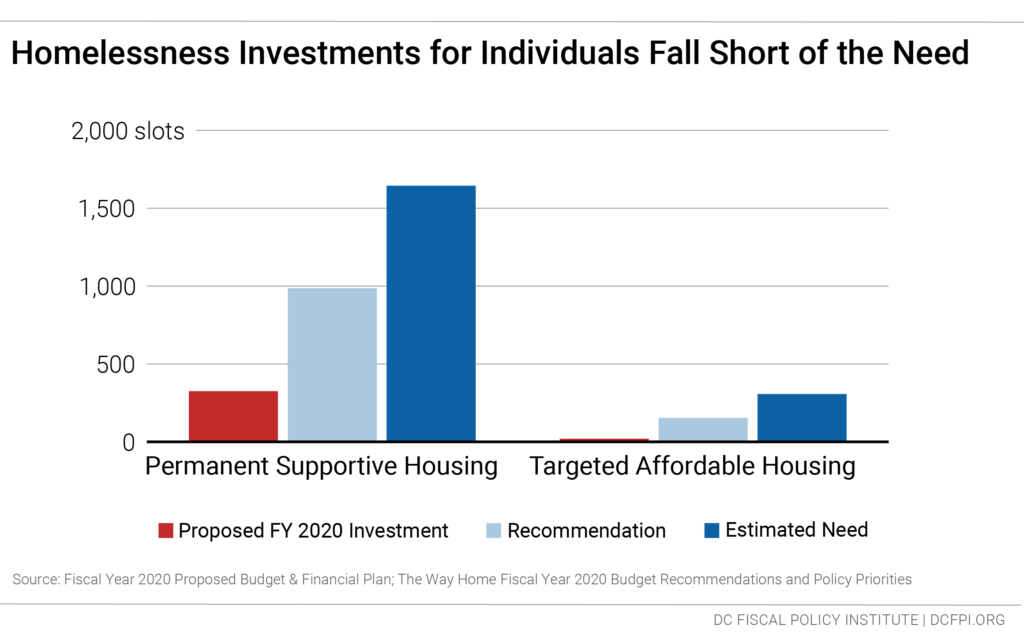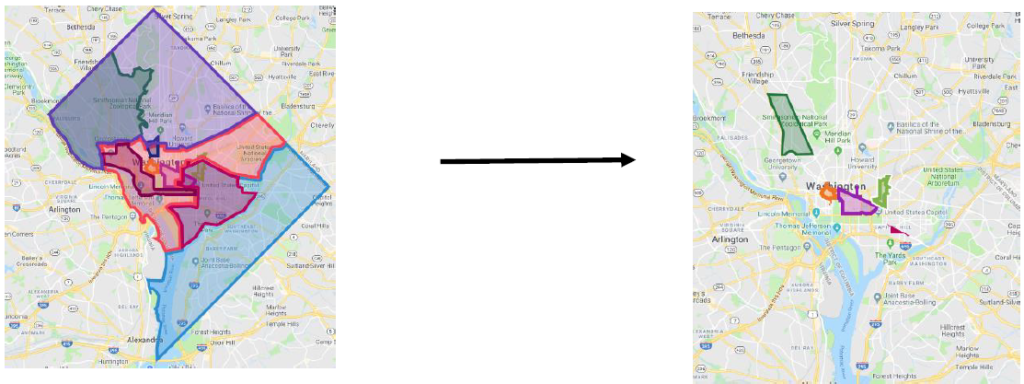Too many DC residents are chronically homeless, meaning they have been homeless for years and suffer from life-threatening health conditions and/or severe mental illness. Residents often die from diseases that could be managed or prevented if they had homes. The proposed fiscal year (FY) 2020 budget makes some investments but falls short of putting DC on a path to end chronic homelessness in the Mayor’s second term. Reaching this goal would require Permanent Supportive Housing and Targeted Affordable Housing for 1,140 individuals this year. The budget includes funding for 345 individuals, just 30 percent of what’s needed (Figure 1).

Chronic homelessness cuts lives short. People who don’t know where they’re going to spend the night struggle to receive needed services like medical treatment or counseling. And they are often forced to stay in places that are unsafe or make their illnesses worse. As a result, the life expectancy of people facing chronic homelessness is far shorter than for those who are stably housed.
As a member of The Way Home campaign, the campaign to end chronic homelessness in the District, DCFPI envisions a future where no one is chronically homeless. The Way Home calls on the District to end chronic homelessness in the next four years. To reach this goal the DC Council should invest $20.8 million in housing and $3.5 million in street outreach:
- Permanent Supportive Housing (PSH): The proposed budget includes $8.8 million to provide PSH to 325 individuals. This is just one-fifth of the estimated need of 1,644 slots, and it is just one-third of the target of 986 set by The Way Home campaign. The campaign is seeking to make rapid progress in expanding PSH because the individuals it serves are the most likely to die while homeless. By providing affordable housing coupled with intensive case management services, PSH helps people stay in housing and improve their health, and saves a substantial amount of money as a result. The Council should add $18.2 million to reach an additional 661 individuals.
- Targeted Affordable Housing: The proposed budget includes $420,720 to provide Targeted Affordable Housing (TAH) for 20 individuals. TAH serves individuals who no longer need PSH services but still need affordable housing. This would open up expensive PSH slots for other individuals experiencing homelessness. TAH also serves individuals in Rapid Re-Housing (RRH) who still need help affording housing when the short-term RRH aid ends. The Council should add $2.6 million to serve an additional 134 individuals.
- Street Outreach: There is a critical gap in funding for outreach services that help individuals experiencing chronic homelessness who are sleeping on the street. Outreach connects them to housing and other supportive services while also increasing health, safety, and quality of life while people are unsheltered.[1] Over the past three years, DC has used federal funding to pay for street outreach that has ended homelessness for over 325 individuals. This funding expires at the end of April. Without additional local funding, outreach capacity will decrease by 25 staff people, leaving only 15 staff and significantly diminishing the supports available to over 600 individuals who are unsheltered. It will also greatly reduce the number of neighborhoods with outreach services (Figure 2). Without the assistance provided by professionally trained outreach workers, our businesses and houses of worship will struggle to meet the needs of their homeless neighbors. We urge the Council to add $3.5 million in local funds to fill this critical gap in services.
You can support these efforts by signing this petition.

[1] Jeffrey Olivet, Ellen Bassuk, Emily Elstad, Rachael Kenney and Lauren Jassil. Outreach and Engagement in Homeless Services: A Review of the Literature https://dmh.mo.gov/docs/mentalillness/litreview.pdf
